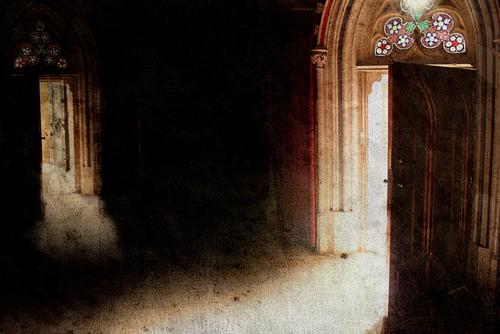
by Sarah Martinez
When Elizabeth Scalia shared a past First Things essay on Twitter, I liked the piece a lot, but not the title: “New Homophiles: Stories Without a Who or a What”. I tweeted a complaint about her promoting the use of Austin Ruse’s insufficient identifier, “New Homophiles”, to describe sexual-minority Christian men and women striving to live according to a traditional sexual ethic. She kindly offered me the floor to suggest something better.
Well, challenge accepted, Elizabeth! I mean, I know a whole mess of these Christians, these “New Homophiles”. Only a few straight people call them that; they will generally refer to themselves as “celibate gay Christians,” “celibate LGBTQ Christians, “celibate queer Christians,” and “side B Christians.” A couple of them are my best friends, and since it’s them we’re talking about, I went to them for feedback. I was sure we’d come up with something; anything, after all, would be better than “New Homophile.”
It turns out finding an alternative to “New Homophile” is complicated, but we must. Why? Because “The New Homophiles” sounds like a unified movement, complete with manifesto, but the serious Christian undertaking of these people of faith is not a movement; it is not an orchestrated body in which members have formed common lifestyles, views, and demands. They aren’t a bunch of activists who fly under a single banner. It’s hard to give a hard, fast, and unanimous label to people who are just trying to live the lives they were given, as followers of Christ, and as people who need the church’s love, ministry and sacraments as much as everyone else.
The lives of celibate queer Christians could only be seen as a “movement” by people wholly outside of this subculture, people who have failed to understand that what is being sought is simply the same pastoral consideration and welcome from the church that every Catholic should rightfully expect: to be seen, made welcome, and included within the Body of Christ, whom they love.
In asking my friends about replacing “New Homophiles” Lindsey — one half of the celibate lesbian couple who blog at A Queer Calling said:
“My general preference is for the clunky “celibate LGBTQ Christian” label. I don’t like anything that makes me sound like I’m somehow a part of a movement when all I’m doing is trying to live my life. ‘The New Homophiles’ makes it sound like we’re one mass of people, acting in concert. Truth be told, we’re all trying to do our own thing while being faithful to Christian teachings of our respective traditions.”
Lindsey added that the source was part of the problem:
“I’ve only seen one person in the celibate LGBTQ Christian sphere argue that we should be trying to reclaim “homophile” as a word for ourselves. Ruse was the first person I’ve ever heard use the word “homophile” and I can’t help but associate it with smear and disdain.”
Part of this discussion necessarily touches on semantics regarding the use of the phrase “same-sex attracted” (or “SSA”) instead of simply saying “gay.” Those prone to using “New Homophiles” often argue that accepting the label “gay” is the same as accepting or participating in the “gay lifestyle,” (i.e., having lots and lots of gay sex). For some others, the use of “gay”, whether one is sexually active or not, is taken as shorthand for accepting your orientation and believing it to be irreversible, and so for them the word is no good, either. If we want to be accepted as faithful Christians, they insist, we should delicately explain that “we experience same-sex attractions” and “we are working on that” for the good of our souls.
I don’t know, but maybe it’s time straight people stop dictating what sexual minorities can and cannot call themselves, especially when the terms being accepted into common parlance come from people who are — at best — mere observers. About Austin Ruse’s initial piece coining the term, Joshua Gonnerman wrote at Spiritual Friendship:
“It almost makes us seem like some exotic tribe, with Ruse as the diligent anthropologist setting out to record and explain our practices. Of course, it is old school anthropology, the kind where you didn’t ask the people you were studying what they were on about, but just developed your own explanations, which you relayed to people who were more distant than you, and coined names for them yourself (though “New Homophiles” does roll off the tongue nicely!).”
Since then, Ruse has written what those he calls New Homophiles consider misinformed at best and slanderous at worst. Even in his most recent post (mollifyingly entitled “The Church Needs the New Homophiles,”) he still seems to be telling sexual-minority Christians to, essentially, sit down, shut up, and blend in as best they can. But if a movement does exist among celibate queer Christians, it is a movement to stop being invisible — to be ministered to by the Church in consideration of their sexual identities, and to help demonstrate to other same-sex attracted Christians that there is value in living out the teachings of the church.
You’d think, given the times (and articles like this one, which decries the loss of so many young Catholics who believe the church to be unwelcoming) that our witness in favor of the teachings of the church would be embraced. Clearly, you’d be wrong.
Here’s what a friend who prefers to go unnamed said:
We are trying to move things, and there is a group of us, but it’s just not the kind of large-scale, cohesive mobilization that many fear it is. We are just living our lives and trying to be faithful, but we think being faithful means challenging the church to address some of its damaging failures to be a community of hospitality and grace, one that actually makes it possible for gay people to thrive.
And here is what one friendly observer added:
If my child told me he was gay and believed there was no place for him within the church, I would really hope that one of these so-called “New Homophiles” was a part of our parish’s pastoral team. I’d want my child to have a role model and a witness — someone to demonstrate that you can be gay and live a faithful, obedient Catholic life, and a rich, joyful one, without succumbing to the secular way.
I don’t have much interest in excoriating Ruse, though, or arguing with him. Especially because one of my pals has already written an open letter to him, and with a tone of charity I am not sure I can match. My point is simply that perhaps we should not adopt into our language a label coined by someone who really does not seem to understand the people about whom he is writing, and toward whom he has not been particularly respectful or kind.
Perhaps the most important objection to the label “New Homophile” of all is this: if it is being used to denote any kind of Christian, it is missing a reference to Christ. “To someone not in the know, “The New Homophile” could as easily refer to a gay atheist, on his wedding day, as to a queer Christian with a traditional sexual ethic. I will not unfairly charge Ruse with consciously de-emphasizing our Christianity, but “New Homophiles” omits Jesus entirely and leaves only a vague and negative impression of the people about whom he writes, while “gay, celibate Christian” more accurately reflects the truth that we are gay men and women, conforming to the teachings of the church out of love for Christ Jesus.
So, “New Homophiles” says too little; for some “gay, celibate Christian” says too much. Can we come up with something better? The Jury is still out, but let me give the floor over to some of my friends, because when there is a discussion about what to call people of a particular mindset, it is only fair to include them.
Sarah, the other half of the blogging couple at A Queer Calling writes about the problems inherent in labels, namely that people understand them differently.
“Another issue is that not everyone lumped in with the so-called “gay celibacy movement” understands “celibacy” to mean the same thing. Lindsey and I do not consider sexual abstinence and celibacy the same thing, but other people do. And sometimes talking about that gets very convoluted. To us, celibacy is a mature vocational pathway just like marriage. But to other people, celibacy (used to mean the same thing as abstinence) is what is expected of every person who is unmarried, even those who will marry later. I’ve heard a lot of Catholics claiming that in order to be celibate, one must be completely unattached from any other person. In Orthodoxy, celibacy has traditionally been discussed in terms of monasticism. But now that there are so many Orthodox people who are living unmarried in the world outside of a monastery, the need for discussing a lay celibate vocation is arising. And in the Orthodox context, “celibate” does not mean that “particular friendships” are out of the question, though many Catholics take issue with that. And in Protestantism, especially recently in the LGBTQ Christian dialogues, “celibacy” and “sexual abstinence” are pretty much always used to mean exactly the same thing. Many people I’ve talked to from Protestant contexts are unable to see celibacy as anything other than denial of one’s sexuality.”
Of course, there are probably as many different ways of living as celibates as there are people living in celibacy. But there are still basic things that celibate queer Christians have in common.
- Even if you believe that celibacy is about more than sexual abstinence, we know that celibacy necessarily includes that.
- Celibate queer Christians are sexual minorities, whether their understanding of their orientation is different from someone else’s.
- It goes without saying that a celibate queer Christian could mean Catholic, could mean Orthodox, could mean Protestant, and what someone means by “Christian” is going to be different depending on the person.
And yet they are all Christians — we aren’t talking about gay Jews or Muslims or secularists. So there is a common framework within which we have to work, sussing out the individual differences as we go, and maybe that framework needs a name.
Lindsey, who might as well have co-authored this piece with me, wrote:
“I think “celibate LGBTQ Christian” works well as a framework. How do different people in this category understand celibacy? LGBTQ descriptors? Following Christ? Those are much cleaner questions than “The New Homophiles” which invites a series of questions like “Why the definite article?”; “New… as opposed to Old?”; and “What in the world is a homophile?””
Gabriel Blanchard of Mudblood Catholic wrote:
Of those already tried, “celibate LGBTQ Christians” may, possibly, be the least unsatisfying from a simply denotative perspective; but due to its clunkiness, I doubt it’ll catch on in the long run — even “the New Homophiles,” while vaguely offensive and a little silly, is succinct. I personally lean toward “celibate queer Christians” as coming the closest to combining clarity with euphony — or perhaps “traditional queer Christians,” for those of us whose claim to be celibate is, er, open to dispute.
I tend to prefer the use of “queer” myself. I think it seems to be the broadest net to capture all the ways one can be a sexual minority, and it’s only one syllable. I use it to describe myself because I’m not quite straight, and I’m also not a lesbian, but “bisexual” seems to imply an equality of preference that doesn’t exist for me. It’s complicated, weird, and, well, queer. On the other hand, a gay male friend of mine said in a private conversation, “I confess I don’t like “queer,” because I don’t think of myself that way.” Fair enough.
My friend Alison points out that though most homosexuals have no problem identifying as gay, some do, and they shouldn’t be left out, as this is an issue that affects them regardless.
“I think we’re leaving out people who do not identify as LGBT or queer (like the SSA crowd). How about “sexual minorities of Traditional ethics”? I like putting minority in our title, because it sends a message that “new homophile” is a slur — because it is a freaking slur.”
Later, Alison would coin my favorite alternative so far: “Sexual Minorities Against Redefining Tradition: SMART.” Actually, if I had to pick one to really catch on, this one would be it.
My friend Matt Jones, who contributes to Spiritual Friendship:
“I’m not sure what I prefer so long as it’s something that actual sexual minorities actually use to describe themselves. Our language is so grossly inadequate and provisional right now, and our experiences so diverse, I don’t know if there’s a word or phrase that can sufficiently do what we want. But I can tell you that “New Homophiles” is, like, right at the bottom of the list.”
So, I’m sorry, everybody, but we never did come up with an agreed-upon alternative to suggest that is pithier than some variation of “celibate LGBTQ Christian,” nor something less weird and gross than “The New Homophiles.” What everyone seems to agree on is that they will take a clunky term over a term that, while succinct, is not accurate — a term that they would not use to describe themselves.
And maybe a clunky name is a mirror of the clunky, complicated, real lives they represent. Maybe it can serve as a reminder to those who are writing about them and talking about them that the lives of “SMART” people and their journeys of faith are not just part of a movement, nor a narrative that can be tied up in a nice, neat nominal bow.
But hey, if you do come up with something better, I hear Matt will give you his holographic Charizard.
 “Sarah Martinez is a nerdy twenty-something in Colorado. She can be found questioning the Messiah at the well and writing things at Misidentifying Wildflowers. Follow her on Twitter @SarahIsTired
“Sarah Martinez is a nerdy twenty-something in Colorado. She can be found questioning the Messiah at the well and writing things at Misidentifying Wildflowers. Follow her on Twitter @SarahIsTired

















